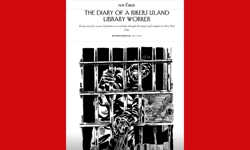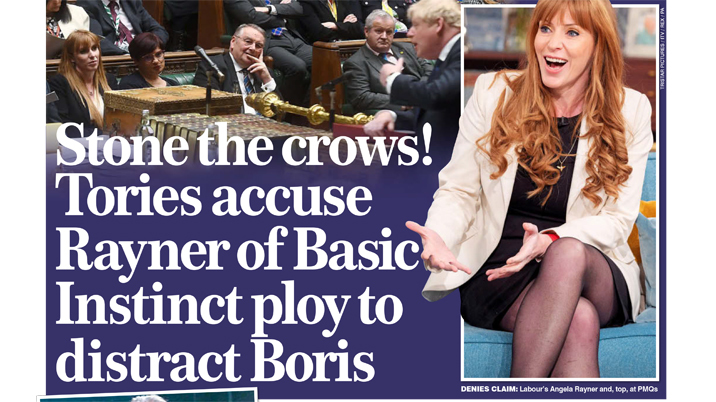
Gunning for Rayner
A long, long time ago, I interviewed a father who was unhappy with his children’s school – the most deprived comprehensive in town. “You’d get a better education in a mud hut in Africa,” he said.
I wrote up the “story”, expecting the newsdesk to be pleased that I had come up with something off-diary. But instead my copy languished in the in-tray for days, sometimes in solitary isolation. The editor had qualms.
Eventually, when there was a desperate need for stuff to fill a big paper, it saw the light of the day at the back of the book. The stink the editor had feared duly wafted into the office, in the form of the headmaster, who was not to be placated with claims of “fair comment on a matter of public interest”.
I was 21 at the time, newly qualified; the editor was also in his 20s. We had no lawyers to guide us, we went on instinct. Mine was wrong, the editor’s was spot on. You can’t go round repeating unfounded accusations of unprofessionalism just to fill your paper.
Both Glen Owen and his editor David Dillon are a lot more experienced than we were, yet they thought it perfectly ok to publish that story about Angela Rayner. They may argue that it was jokey – as evidenced by the use of the word “mischievously” in describing the Tories allegedly making these claims about her PMQs leg-crossing – but this was designed to make the Labour deputy leader, rather than the anonymous misogynists, look bad. Why else did it feel the need to mention what Ms Rayner did at 16? It tends not to detail male Tory MPs’ school histories.
Had the story been intended to show up the dinosaurs and sexists who still populate Westminster, wouldn’t the word “smear” have appeared? It surely would have done if Labour MPs were whispering similarly unpleasant things about, say, Liz Truss. And the final half of the opening sentence “if the claims of Tory MPs are to be believed” is the golden key to the fact that Owen doesn’t believe a word of what is being alleged, but he’s going to repeat it anyway.
One newspaper editor suggested to me yesterday that the whole thing could have been cooked up in conference; somebody commenting that Rayner crosses her legs a lot and Owen then being despatched to find someone to accuse her of being a distraction. Owen and Dillon would probably be outraged at such a scenario, and, if I approached them for a comment, they might well say “Who is this anonymous editor? You can’t print that.”
Rather as Rayner urged the paper not to print at the weekend.
This was designed to make the Labour deputy leader, rather than the anonymous misogynists, look bad.
The Speaker wades in
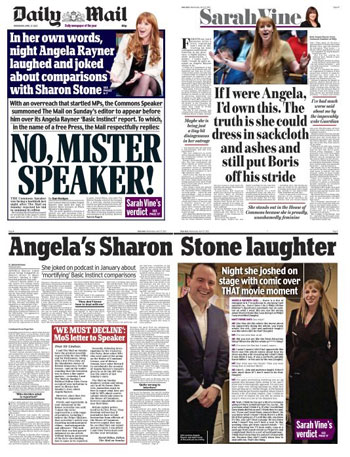
Then in comes Lindsay Hoyle to muddy the waters by “summoning” Dillon to Westminster, an invitation the Mail on Sunday editor “respectfully declined”. And suddenly it becomes a matter of free speech. An issue of such moment that the paper’s daily sister weighed in yesterday with a splash, a spread, a leader and a Sarah Vine column.
This from the paper that yelled “Don’t they know there’s a war on?” and “How long can the Partygate farce go on?” when MPs wanted to investigate whether the Prime Minister lied and, if so, should he resign; the paper that argued there were far more important things to worry about. Like the right to publish unfounded gossip from the mouths of people too cowardly to be named.
Doesn’t the Mail know there’s a war on? There are more important issues for it to tackle on its front page. Except in a way it was right. Press freedom is a precious thing to be cherished. The Speaker is treading in dangerous territory by suggesting that he might influence how Parliament and politics are reported.
But if it’s right on this, it just shows how wrong it was on Partygate (it didn’t even report the Commons launching the standards investigation on its front). It may think the whole thing is a trivial distraction; but there is a principle at stake – one of probity in public life. I may think that the Rayner slur is indefensible, a sloppy hit job built on a non-story and possibly libellous; but when the Speaker involves himself, there is a principle at stake – one of free speech.
Tricky things, values, aren’t they?
The Speaker is treading in dangerous territory by suggesting that he might influence how Parliament and politics are reported.
Who’s counting?
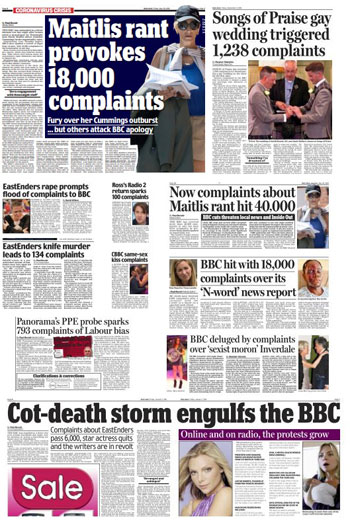
The Rayner story hasn’t gone down well anywhere, bringing criticism of both the paper and the people quoted in it. If the MoS thought it would damage Rayner, it was mistaken. Even Sarah Vine suggests it enhances her reputation, while damaging what’s left of the Prime Minister’s by suggesting that he could be so easily distracted from the job in hand. More than 5,500 people have taken the trouble to complain to Ipso about the piece. That seems quite a lot. But strangely the daily hasn’t felt the need to mention these complaints – even among the 4,000 words it printed about the furore yesterday.
But these are just complaints, they haven’t been upheld (yet), so maybe in the Mail’s eyes, they don’t count and are not worth noting. Even though just about everyone else did.
It does seem strange, though, given the paper’s history of logging irate viewers’ complaints against the BBC over the years. Sometimes such stories are clearly intended to highlight the intolerance, out-of-touchness, or over-sensitivity of the complainant. Sometimes they point to “orchestrated campaigns” against such right-thinking people as John Humphrys or Nigel Lawson. But mostly, they are there to demonstrate how the BBC has got it wrong.
Last December, for example, complaints “flooded in” over the Princes and the Press documentary. There were about 150. There was another “flood” about an EastEnders rape scene back in 2014 (278). In fact, there’s been a lot of complaining about EastEnders: a knife murder brought in 674, a cot death 6,000 – a few more than have gone into Ipso about the Rayner story so far, so in my book definitely worth noting.
As were the 18,000 who wrote in about Emily Maitlis’s “rant” over Dominic Cummings on Newsnight – a number that quickly doubled to 40,000 as people piled in to protest after the BBC rebuked its presenter. Both were reported by the Mail, even if the second headline made it look as though all the complaints were about Maitlis, rather than evenly split between her and the corporation’s response. Another 18,000 complaining about the use of the N-word in 2020 made a page lead, then there were the 674 for John Inverdale, 300 for Stephen Fry at the Baftas, 189 who didn’t want same-sex couples on Strictly and 1,238 who took agin a gay wedding on Songs of Praise.
There are countless more examples, but you get my drift.
It does seem strange, though, given the paper’s history of logging irate viewers’ complaints against the BBC over the years.
How dare she!
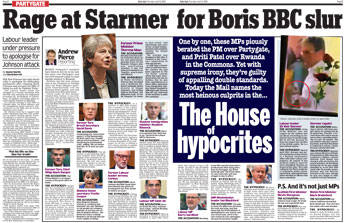
Meanwhile, the Mail runs yet another Andrew Pierce spread on the “House of hypocrites” – MPs who say one thing and do another, or change their minds, or even question someone else’s new approach to an issue they themselves have tripped up on in the past.
Like Theresa May.
She stood up and criticised the plan to send asylum-seekers to Rwanda. It’s fair to say that as Home Secretary, May was not entirely sympathetic to immigrants and the “Go home” vans that made a brief appearance under her watch were a low water mark. But whether it’s hypocritical then to denounce a scheme that she feels crosses a line is another matter. Isn’t it right that MPs should speak up when they think their leaders are making a mistake? Is it disloyal and hypocritical to do so? If so, how does the Mail square that with the way it championed first Cameron, then May and then Johnson – and then pulled each of them up when they strayed from what the paper believed to be the right path?
Is the war still on?

And then there’s the “Don’t they know there’s a war on?” news imperative. Ukraine, you may remember from last time, was the overriding matter of import from which attention should not be distracted. Even by an examination of how a serving Prime Minister broke his own laws and whether he lied about doing so.
Since that headline appeared, the Mail has put Ukraine on its front page once – as often as the dazzling Duchess (Kate, that is). The Queen has been there twice (well it was her birthday), Harry three times, Meghan twice, and William and Louis once apiece.
Other pressing issues to feature at the top of the front have been, “Is it a terrible faux pas to order fish on a first date?”, “Why the menopause turbo-charges women’s brains”, and “Where do YOU stand in the great ‘shoes off indoors’ debate that’s dividing Britain?”
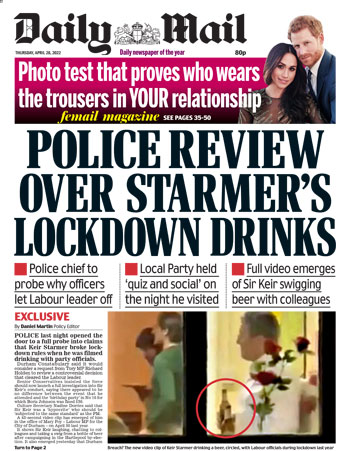
Then this morning we have an exclusive splash: “Police review over Starmer’s lockdown drinks”. Yes, really. The inside spread reports on a 43-second video of the Labour leader “swigging beer” and chatting with “several others” under the heading “Was this really a work event?” and the top leader says that Starmer should feel the long arm of the Covid law. This would all be legitimate, if only the paper hadn’t been screaming for weeks that all those drinking sessions in Downing Street really didn’t matter at all, that the police investigation was a waste of resources, that the whole thing was a blown-up farce and a distraction. You couldn’t make it up.
As to that solitary Ukraine front? It was about “Boris sends in our tanks”, which is usually shorthand for “We’re sending tanks and troops to fight”, but in this case meant “we’ll lend them some kit”. Apart from that – even with Putin testing his deadliest weapons, horrific stories of rape and the murder of babies, the diplomatic initiatives, the bellicose rhetoric – the furthest forward the war has appeared has been the 6-7 spread.
Gunning for Johnson

If the Mail is studiously ignoring Partygate, the i has been relentless in what appears to be its determination to see Boris Johnson evicted from No 10. Six of the past fortnight’s 12 splashes have been about the movement against him and two more about plans to abandon key policies to appease his backbenchers.
To be honest, I’m not sure which is worse in terms of failing to serve the reader. So, I find myself mildly impressed by the varied diet served up by the Telegraph these past two weeks. We’ve had the war, Macron and lockdown as well as the Rwanda controversy and less-than-slavish coverage of its former star columnist’s travails. Quite the mix.
Also, bearing in mind that they are like-minded papers, it’s worth comparing the “BBC slur” lead headline on the Mail’s ‘House of hypocrites’ spread above with the Telegraph’s report of Johnson’s remarks a day earlier. One wonders if there was equal rage and pressure for the Telegraph and its source to apologise.
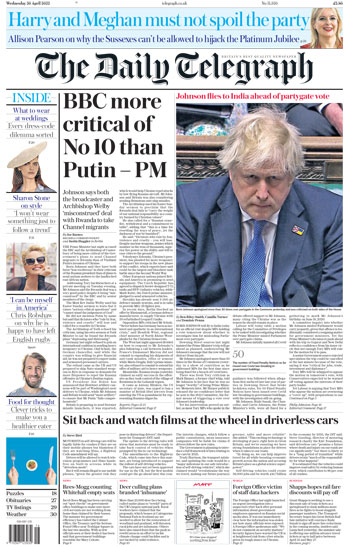
Ignoring Piers

The media event of the week here in the UK (it’s tough to beat Musk buying Twitter) must surely have been the launch of a new TV station. And one with Piers Morgan as the star turn. And his (ex?) friend the former president as the first guest. Hard to ignore, eh?
Talk TV is Rupert Murdoch’s latest baby and, as such, has been the subject of much pre-publicity in his favourite child, the Sun. (Morgan’s back there, too, as part of a zillion-pound package, in case you haven’t noticed). So last Thursday, we had a spoiler-trailer splash with Grumpy v Trumpy, which reported that the former president had “stormed out” of the interview. Then on launch day – Monday – there was another spoiler with more from the interview and the Don’s views on Harry and Meghan. I’m not sure an out-of-office American’s views on what the Queen should do with regard to her grandchildren is of much general interest (let alone when there’s a war on and a cost-of-living crisis), but, come on, be fair, this was The Day. Let the Bun have its fun.
Meanwhile Morgan was putting it about a bit to drum up a bit of interest – on top of his Twitter output, that is. There he was “exclusively” in the Sunday Telegraph, Sunday Times and Mail on Sunday (having also put in an appearance in the Spectator), telling the world that he was joining the war on woke: “Cancel culture liberals are the new fascists” was the Telegraph’s puff line. (I’m not happy about the way words like ‘fascist’ and ‘Nazi’ are banded about these days, but that’s another matter.) The Daily Telegraph also gave it a page in the business section on launch day.
When it came to it, Morgan’s inaugural show attracted a peak of 400,000 viewers and an average of 317,000, both surpassing the audience achieved by Andrew Neil on GB News’s first night. Morgan also claimed that his Trump interview was watched by more people than watched BBC News, Sky News and GB News combined. That’s a bit of apples and oranges; a chat show is not a news bulletin. But not a bad start.

Needless to say, the News UK papers reviewed the programme – the Sun in predictably glowing terms and the Times in more measured glowing terms – as did the Guardian and i, equally predictably in more sceptical terms.
But what I found surprising was the way it was ignored by the rest. The Telegraph and Mail devoted their “Last night’s TV” slot to Miriam Margolyes, the Express to “Icy Wim’s wigwam bam”.
Print rivals may not care for Murdoch or Morgan, but it does seem remiss for so many to have ignored the launch altogether.
What I found surprising was the way it was ignored by the rest.
Missing children

Silly me. Last time I thought that only the Mirror could think someone saying they were sure their friend had kidnapped Madeleine McCann was a story. I hadn’t looked at the date. This week, the Sun came up with even less of a story: that the man in a German prison who is now the prime suspect has no alibi.
Er? This is as far as we’ve got in the 22 months since Christian Brueckner was first linked to the hunt?
In case you haven’t been following this closely, Brueckner was apparently in Portugal around the time Madeleine disappeared, but then said he had four people who could give him an alibi and now the German police say “not as far as we know”. The Portuguese police have meanwhile formally named Brueckner as an arguido – official suspect – the status you may remember they had previously accorded Kate and Gerry McCann and a British property consultant early in the investigation.
Please take that as your “in previous episodes” recap because you can be sure that in the coming days there will be much more of this. And then it will go quiet. Until next spring.

For the thing about the McCann investigation is that “developments” always seem to come out of the blue around the anniversary of her disappearance. Indeed, the fact that Brueckner entered the stage in June, rather than late April or early May, is so strikingly unusual that any Midsomer addict would immediately have him down as bang to rights.
“Anniversary” developments have included sniffer dogs being sent in, diggers being sent in, new witness testimony being released, new suspects being sought, new suspects being named (including a German child killer who wasn’t Christian Brueckner), money being poured in, money being halted, the investigation being wound down, the investigation being revived. And all the time, there are the McCanns saying, “Please don’t forget Madeleine”.
The Express has come in for a lot of mockery for using Madeleine on its front page almost as frequently as it did the Princess of Wales. But it is the Mirror that has been the most loyal devotee. In the 15 years since she disappeared, the paper has only twice failed to find at least one Madeleine anniversary splash or front-page puff. And in those years – 2013 and 2018 – there was something inside.
In 2009, the paper ran a leader headlined “Remember all the missing children”. Hurrah! Acknowledgement at last that there are others. Except that’s all it said. The actual leader was all about Madeleine and, apart from the sentiment in the headline and payoff, not one other missing child was mentioned in the paper.

The McCann case is extraordinary in that it has remained unresolved for so long. But that wasn’t what made it special from the outset. The blue-eyed blondeness, the good-looking middle-class professional parents, the holiday resort known to many Britons all added flavour to the mix. No one would wish the McCanns’ ordeal on anyone. But I really wish they – and the media – had used this super-high profile case to draw attention to others as well, to help to reunite other suffering families. Latest government statistics (which are a couple of years old) show that more than 1,600 children are logged as “long-term missing persons”, which means they have been missing for more than a month. Some haven’t been seen for years. Some have probably been abducted by parents, murdered or trafficked. Few have been gone for as long as Madeleine.
But when the next anniversary documentary appears on Channel 5 and its “15 years on” findings end up on the tabloid front pages next week or the week after, please remember there are other families, whose children may not be quite so conventionally photogenic, who are equally deserving of our interest and compassion.
The Express has come in for a lot of mockery for using Madeleine on its front page… But it is the Mirror that has been the most loyal devotee.
Front page of the fortnight
No standouts for me this time, but here are two that made me smile:
The Telegraph for the juxtaposition of the embattled Prince Harry alongside a “captured Briton” headline.

And the Star, just because…

PS: And I liked this head in the Sun

Liz Gerard’s Notebook is a fortnightly column published in the InPubWeekly newsletter. To be added to the mailing list, enter your email address here.










